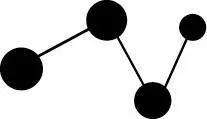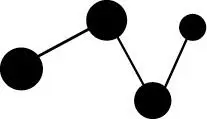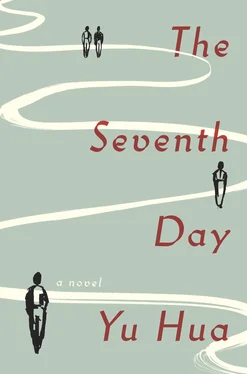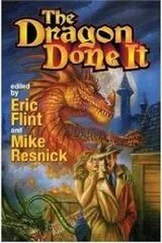My father’s village, when I finally got to it, was nothing like the village that I had visited as a child. That village was skirted by trees and stands of bamboo and several ponds. My cousins and I had shot at the birds in the trees with catapults, and we had rolled up our trouser legs and waded into the ponds to catch little shrimp. In those days, field after field shimmered with rapeseed blossom; the voices of men and women, young and old, mingled with the sounds of chickens and ducks, oxen and sheep; and pigs careened along the paths between the fields. The village now was desolate, the fields lying empty, the trees and bamboos cut down. The ponds had disappeared. The young and able-bodied had all abandoned the village for jobs in the city, and the only people I saw were a few old-timers sitting outside their houses and the occasional toddler wandering around. I was doubtful I would recognize my father’s siblings, so when I came upon a hunchbacked old man smoking a cigarette by his front door, I asked him where I’d find Yang Jinbiao’s brothers and sisters. He muttered “Yang Jinbiao” a few times before he remembered. He called out to another oldster peeling fava beans across the way, “Here’s someone looking for you.”
The old neighbor got to his feet and studied me as I walked over, rubbing his hands on his pants in preparation for greeting me. I went up to him and introduced myself as Yang Fei. That elicited no reaction, so I told him I was the son of Yang Jinbiao. “Ah!” he went, then opened his toothless mouth to call his siblings: “Yang Jinbiao’s son is here!”
Then he turned to me. “You’ve grown so tall, I’d never have known it was you.”
Four other old folk emerged one by one to join their brother. All five siblings wore cheap polyester clothes, and standing in a group they looked very much alike. They differed only in their heights, like the fingers of a single hand.
They were very pleased to see me. I accepted the cup of tea they poured for me but shook my head at the proffered cigarettes. Almost immediately they began to busy themselves washing and chopping vegetables and fetching wine. Seeing that it still wasn’t quite three in the afternoon, I said it was a bit early to start preparing dinner, but they disagreed.
With the passage of years, they were no longer jealous of my father, and they all got a bit red around the eyes when they learned he had disappeared after falling critically ill. Perhaps because their fingers and palms were so rough, they used the backs of their hands to wipe away their tears. I told them I was looking for my father and thought he maybe wanted to die where he’d been born, but they shook their heads and said he’d never come back again.

In the silence, I stood up and left the rock on which I’d been sitting. Sleet continued to billow, but still it did not fall on me — it simply surrounded me. When I walked on, the sleet opened a passage, and when I looked back, it had closed up again.
On the path of memory I was making my way toward Li Yuezhen.

By the time I returned to the city from my father’s village, Li Yuezhen was no more. As she was crossing the road in the evening, she was knocked off her feet by a speeding BMW, and as she lay sprawled on the road she was run over first by a truck and then by a delivery van. In the three short days that I was away, I had lost the mother figure so dear to me.
Hao Qiangsheng was overwhelmed by shock and grief, and his daughter was in transit back from the United States. When I arrived at their house, Buddhist priests were conducting a service to ease the passage of the departed soul. Incense swirled around the room and a yellow cloth lay on the table, with fruit and cakes laid out on top, along with a tablet inscribed with Li Yuezhen’s name. Several priests stood in front of the table with their eyes half closed, chanting a sutra in a constant hum, like that of mosquitoes. Hao Qiangsheng sat off to one side with a dull look in his eyes, and I sat down next to him.
The priests perhaps knew that Li Yuezhen had been planning to emigrate to the United States, for after reciting the sutra they told Hao that during the service Li Yuezhen’s soul had clambered over his knees and over his shoulders, up and into heaven. The fee for the funeral service was three thousand yuan, they said, but with the outlay of another five hundred yuan they could ensure that Li Yuezhen would be reincarnated in a new body in the United States. Hao Qiangsheng nodded woodenly, so the priests closed their eyes once more and resumed their recitation. This time the reading was short, and though I couldn’t make out most of the words I did hear references to America — not the regular Chinese term for it, but the English abbreviation, “U.S.A.” The priests said that Li Yuezhen had already begun the journey to U.S.A. and would be there shortly, even faster than if she traveled on a Boeing jet.
Hao Qiangsheng didn’t seem to register my arrival, and I had been sitting there for quite some time before he realized who I was. Now he burst into tears and grasped my hand. “Yang Fei,” he cried, “you’ve got to go and see your mom!”
Three days before her death — on the morning I went to the village to look for my father, in other words — Li Yuezhen had stumbled upon a scandal. As she crossed a bridge on her way back home from the market, she saw a number of human fetuses floating in the river below. At first she thought they were dead fish, but couldn’t understand why they seemed to have arms and legs. Wondering if her eyes were playing tricks on her, she asked a couple of young people nearby to come over. They said it didn’t look like fish, but like babies. When Li Yuezhen hurried down the steps to the riverside, she could see that they were right. Tiny babies were floating downstream amid a tangle of sticks and leaves, and soon several more babies emerged from the shadows underneath the bridge and bobbed on the sunlit surface. As she strained to make them out, Li Yuezhen stumbled over an obstacle underfoot. She looked down to find three fetuses snagged on the bank.
Li Yuezhen felt it her duty to report this find. Instead of going home, she proceeded directly to the offices of the local newspaper, her basket of groceries under her arm. The guard at the entrance, noting her unpreposse  ssing appearance and suspecting she might be coming to lodge a complaint against the authorities, told her that she needed to go to the Letters and Visits Office of the city government. So she waited outside, and managed to intercept two reporters just arriving for work. They rushed to the scene, by which time both bridge and bank were crowded with people and some were using bamboo poles to maneuver the dead babies ashore.
ssing appearance and suspecting she might be coming to lodge a complaint against the authorities, told her that she needed to go to the Letters and Visits Office of the city government. So she waited outside, and managed to intercept two reporters just arriving for work. They rushed to the scene, by which time both bridge and bank were crowded with people and some were using bamboo poles to maneuver the dead babies ashore.
In the course of that morning the two reporters and a dozen or so locals found twenty-seven babies, both infants and fetuses. The eight infants wore, around their feet, tags on which the name of the city hospital was printed; the nineteen fetuses had no such identifica  tion. After taking photos with their mobile phones, the reporters paid a visit to the hospital. They were received warmly by the hospital director, who assumed they had come to interview him regarding new hospital procedures designed to alleviate the difficulty and expense of securing medical treatment. One look at the photos of the dead babies, and the director’s smile disappeared. He announced that he had to head off to an important meeting immediately, and he called in a deputy to deal with the reporters. After seeing the photos, the deputy director informed the reporters that he had a meeting at the public health department; he turned them over to the hospital’s office manager. After glancing testily at the photos, the office manager identified the foot tags. These infants, he said, had died after failing to respond to treatment; their parents had fled because they couldn’t afford to pay the medical expenses. Patients’ families were always trying to get out of paying their bills, he groused, generating losses of over a million yuan for the hospital every year. The nineteen fetuses, without tags, had been aborted at the end of the second trimester in order to comply with population-control guidelines. Population control is a national policy, after all, he reminded them condescend
tion. After taking photos with their mobile phones, the reporters paid a visit to the hospital. They were received warmly by the hospital director, who assumed they had come to interview him regarding new hospital procedures designed to alleviate the difficulty and expense of securing medical treatment. One look at the photos of the dead babies, and the director’s smile disappeared. He announced that he had to head off to an important meeting immediately, and he called in a deputy to deal with the reporters. After seeing the photos, the deputy director informed the reporters that he had a meeting at the public health department; he turned them over to the hospital’s office manager. After glancing testily at the photos, the office manager identified the foot tags. These infants, he said, had died after failing to respond to treatment; their parents had fled because they couldn’t afford to pay the medical expenses. Patients’ families were always trying to get out of paying their bills, he groused, generating losses of over a million yuan for the hospital every year. The nineteen fetuses, without tags, had been aborted at the end of the second trimester in order to comply with population-control guidelines. Population control is a national policy, after all, he reminded them condescend  ingly. The twenty-seven babies were medical refuse, he declared, and the hospital had done nothing wrong: trash has to be dumped, after all.
ingly. The twenty-seven babies were medical refuse, he declared, and the hospital had done nothing wrong: trash has to be dumped, after all.
Читать дальше



 ssing appearance and suspecting she might be coming to lodge a complaint against the authorities, told her that she needed to go to the Letters and Visits Office of the city government. So she waited outside, and managed to intercept two reporters just arriving for work. They rushed to the scene, by which time both bridge and bank were crowded with people and some were using bamboo poles to maneuver the dead babies ashore.
ssing appearance and suspecting she might be coming to lodge a complaint against the authorities, told her that she needed to go to the Letters and Visits Office of the city government. So she waited outside, and managed to intercept two reporters just arriving for work. They rushed to the scene, by which time both bridge and bank were crowded with people and some were using bamboo poles to maneuver the dead babies ashore.









